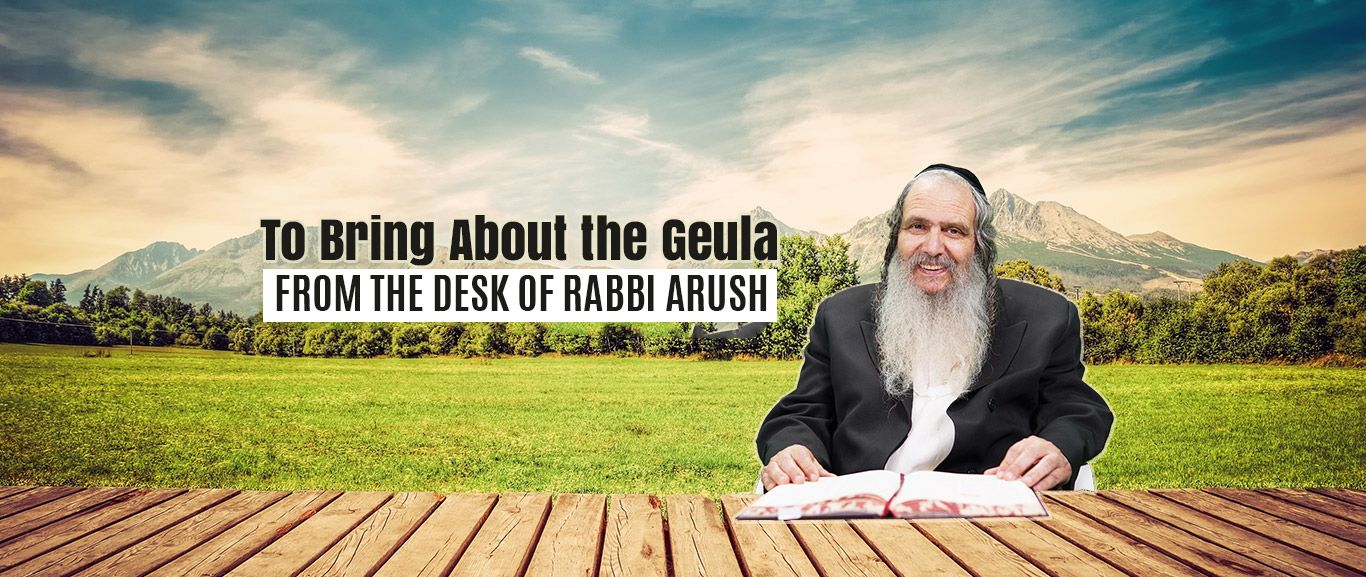
To Bring About the Geula
A Jew is sure that Hashem is a good Father and does only good, but everything is going badly. Where are the miracles? Where are the salvations? It's not a question - it's a scream!

Translated from Rabbi Arush’s feature article in the weekly Chut shel Chessed newsletter. The articles focus on his main message: “Loving others as yourself” and emuna.
Hiding His Face?!
“The Rabbi tells stories about people who sang the song ‘Hashem yitbarach always loves me’ and experienced supernatural salvations, but I am seeing the exact opposite.” So said one of the people who attends my classes.
“And it’s not that I don’t believe,” he continued. “I fully believe that Hashem loves me. When I first heard the Rabbi saying these things, I knew it is the truth. It touched my soul; it strengthened me very much and gave me hope. For two weeks I was ecstatic. I was happy in spite of the huge difficulties I’m experiencing. But…
“But everything crashed. Not only did I not have any salvations, but things got worse. I am frustrated. I am really sure that Hashem is a good Father and does only good, but everything is going badly. Where are the miracles? Where are the yeshuas (salvations)?”
Healing Words
It is painful to hear of a Jew who is suffering, but I was very happy that he asked that question, because it’s a very important and essential question. It’s not even a question – it’s a scream. A Jew fully believes in Hashem, but inside he is furious. And he is not the only one. There are many, many like him. We live in the world of falsehood and in a generation that experiences much suffering in all realms of life.
So, when we speak we must be very exact, because the healing and the salvation lie in our words, and only in them.
Actually, this is Moshe Rabbeinu’s cry at the end of the previous parasha: “Hashem, why have you brought harm to this people? Why did you send me [on this mission]?” Our parasha is Hashem’s answer to this exact question!
What made Moshe cry out? After long years of terrible suffering on the part of Bnei Yisrael in Egypt, Hashem reveals Himself to Moshe and tells him of the coming geula (redemption). Moshe comes to the Jewish people, and they believe what he says and thank and praise Hashem, and then Moshe and Aharon go to Pharaoh with a demand that he releases the Jewish people – and after that everything seems to get worse and worse.
That same day, Pharaoh decrees that straw will no longer be supplied to Bnei Yisrael. This decree increases the difficulties many times over and everyone is adversely affected – both the Jewish foremen and the poor slaves. Instead of celebrating in the desert, the life of Bnei Yisrael becomes unbearable – and just then Moshe disappears for six months!!
How could Moshe not call out? And he cries from the depths of his heart: Why have you brought harm to this people? Why did you send me? Where are all those promises?! Where is all the good?! How can I return to Bnei Yisrael and speak to them about the geula and yeshua, after I just caused them harm and then disappeared?
More Geula
Hashem yitbarach reveals Himself to Moshe and tells him: “I am Hashem!” – I am all mercy. Until now I have not revealed Myself in My trait of mercy – “I appeared to Avraham… but by My name Hashem I did not make Myself known to them.”1 The holy Patriarchs knew and fully believed that Hashem is good and that there is nothing evil in the world, but Hashem was operating in hidden ways, but now, says Hashem, the time has come to reveal My trait of mercy, in other words, My love to the Jewish People!
Hashem goes on to tell Moshe Rabbeinu that He made a covenant with the Patriarchs, and promised to give them the land of Israel, and now, when He hears Bnei Yisrael groaning and praying – He is remembering His covenant and intends to fulfill His part.
And then Hashem sends a message to Bnei Yisrael and says to Moshe: “And therefore say to Bnei Yisrael, I am Hashem”2 – reveal to them that I always love them. And that is why there appear now five expressions of geula (redemption): Vehotzeiti, vehitzalti, vega’alti, velakachti, veheveiti (I will free you, I will rescue you, I will liberate you, I will take you, I will bring you), in other words, you will experience more good and better and better.
The expressions of geula and the Ten Plagues and the Splitting of the Sea – are all part of “better and better” – another revelation of love, another revelation of emuna (faith), more abundance, more liberation from slavery, more building of personal freedom, more preparation for the Giving of the Torah.
And already now, before the geula and before one sees the miracles, Hashem tells Bnei Yisrael: Even when My conduct towards you is concealed, and even when you don’t see or feel anything, and even when reality looks the opposite of good – I am Hashem, I love you, and My promises and My covenant stand strong, do not change and will never change.
Turning Point
And that is precisely the big nisayon (test) of emuna: to know and discover that Hashem is good in all situations. When Hashem announces this to Bnei Yisrael in the depths of darkness – that is precisely the beginning of the geula. The beginning of the geula is to tell Bnei Yisrael, to announce to them, to reveal and publicize that Hashem loves them and that they will have only good and even better – your faith in My goodness and your belief that things will be good for you are, so-to-speak, what brings down into this world the special conduct towards Bnei Yisrael and the revelation of “I am Hashem”, Hashem’s love, and that is what activates all the tremendous revelations of the process of geula.
Today, too, thanks to Hashem’s loving-kindness, we are witness to the phenomenon that from every window, from every passing vehicle, come words of emuna and bitachon for the Jewish People. This phenomenon has no explanation besides Hashem’s desire to tell us Jews that He loves us.
And just like in the Exodus from Egypt the announcement of “I am Hashem” is what ignited the entire process of geula, so too, the publicizing of Hashem’s love to the Jewish People in our own days is a tremendous chizuk (strengthening factor) for all of us, that we will have good and even better.
Your Yeshua!
And this is what ignites the personal salvation of each and every Jew. This is what will bring your yeshua – really!
And now we will answer the person who asked the question and all those sufferers who still don’t manage to see the good in reality:
Dear brother, you are going through a difficult test; and it is especially you who should sing endlessly “Hashem loves me and I will have only good”; it is especially you who should maintain this holy knowledge about the faith, and hope that things will certainly be good, as we will now explain.
When you sing and say, “Hashem loves me and I will have only good,” think about what is happening to you now. Apply this sentence to all the troubles and problems and suffering you have in your life. Apply this to all the things the good of which you can’t see – that is exactly what you should sing about: “Hashem loves me” as I am, now and in every situation; and everything that happens to me, it is coming only from love, because even when Hashem rebukes us, He loves us; “And I will always have only good” – even what is happening to me now is only good; it isn’t bad. There is no evil in the world. It is good – Hashem does only good.
“And I will only have better and better” – there is no doubt that Hashem will continue to do good for me and I will see this good in reality as well. There is no doubt that the good will be revealed and will change into a kind of goodness that I can see and understand, because that is Hashem’s honor and the revelation of His kingship – when He pours abundance and much good on Jews! When he redeems the Jewish People and redeems every Jew, His faith is revealed, and all human beings know Him and recognize His existence.
Dear Jews, Rabbi Nachman says that emuna is “erech apayim” (patience).3 Emuna is patience. Patience means to hang on with full emuna even when reality seemingly belies this idea. This is the emuna that we know will bring us towards the complete Redemption, and this is the emuna that will bring you all the salvations and all the good things in your life.
Editor’s Notes:
1 Shemot (Exodus) 6:2-3
2 Shemot 6:6
3 Likutei Moharan 155:2





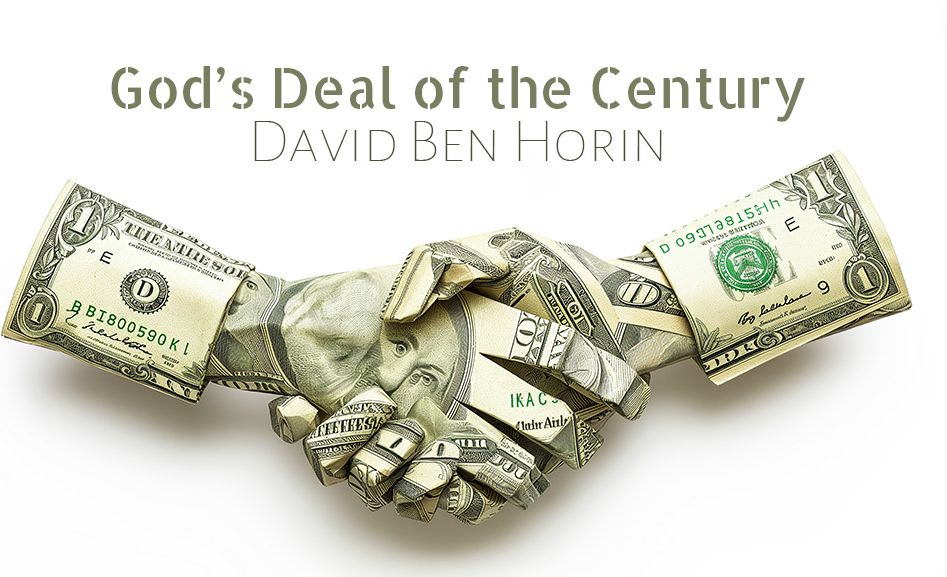

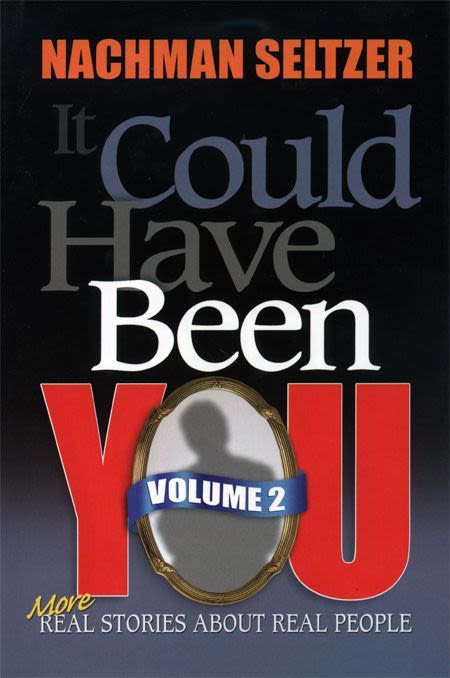
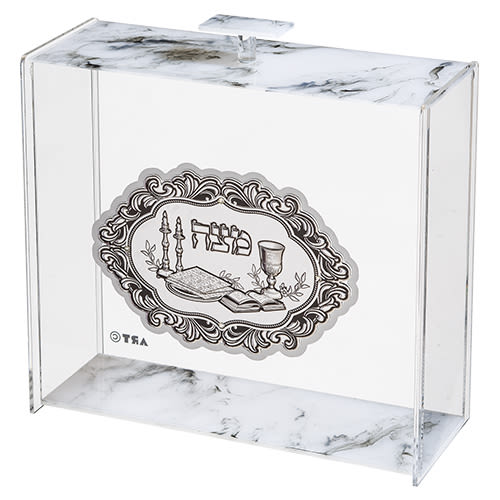

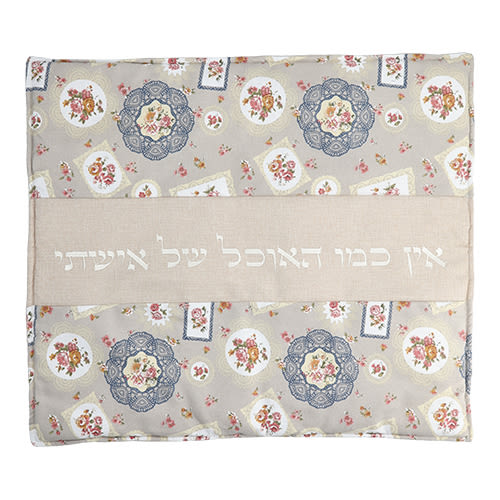
1/24/2025
Thank you Rabbi, this is just the reminder that I needed to hear.